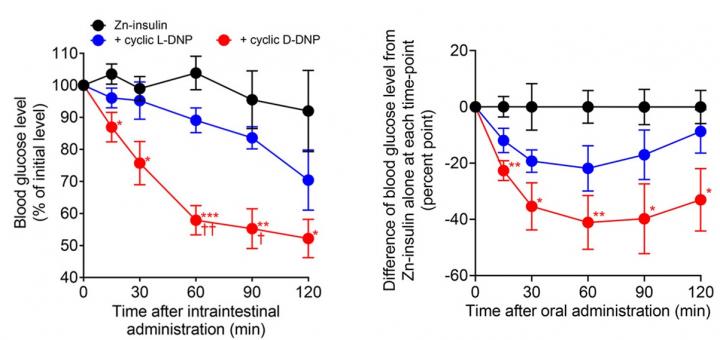Can insulin be administered orally by simply mixing it with a small intestine permeable cyclic peptide?

Left: blood glucose levels continued to decrease from 15 to 60 minutes after administration. This decrease in blood glucose levels persisted until at least 120 minutes after administration.
Researchers from Kumamoto University, Japan have found that DNP peptide, a small intestine-permeable cyclic peptide originally used as an insulin additive to improve absorption into the small intestinal, lowers blood glucose levels in mice. They also found that insulin can be administered orally by simply adding D-form DNP peptide (D-DNP) peptide to injectable insulin used in clinical practice. This study is expected to provide a basis for the development of oral insulin using DNP peptides.
Insulin therapy by self-injected insulin is currently the best way to control blood glucose. However, self-injection is painful and a major burden for many diabetics. The development of oral insulin is strongly desired to improve their quality of life. Although it has been over 100 years since the discovery of insulin, oral insulin has yet to be developed. This is mainly because insulin is not absorbed in the small intestine and it is broken down in the gastrointestinal tract. To solve this problem, researchers used a DNP peptide that can permeate large molecules across the small intestine, which they previously discovered, and an insulin hexamer that was created by adding zinc.
First, the research team synthesized a DNP peptide using D-amino acids (D-DNP peptide) to inhibit the gastrointestinal degradation of DNP. Then, to reduce the gastrointestinal degradation of insulin, researchers created an insulin hexamer (zinc insulin hexamer) by combining zinc chloride and insulin. A mixture of the D-DNP peptide and insulin hexamer was then administered into the intestinal tracts of mice to study the absorption rate. Five minutes after administration, insulin was detected in the portal blood, and blood glucose levels started decreasing between 15 to 60 minutes after administration. The reduced glucose levels were sustained until at least 120 minutes after administration. Additionally, when the mixture was administered orally, blood glucose level began decreasing after 15 minutes and was maintained for least 120 minutes. For both administration methods, the D-DNP peptide produced a stronger hypoglycemic effect than a L-DNP peptide synthesized from L-amino acids. Furthermore, when the mixture was administered intraintestinally and orally to diabetic model mice, blood glucose levels began decreasing after 30 minutes.
Based on their previous work, and the fact that many insulin injections already contain zinc insulin hexamers, the researchers hypothesized that oral insulin could be developed by adding the D-DNP peptide to insulin injections currently in use. Thus, they added the peptide to HumulinR3/7 (an injectable insulin) and tested it on mice orally.
Their positive results suggest that oral insulin development is possible by simply adding D-DNP peptide to existing insulin injection formulations because the combination of D-DNP peptide with a zinc insulin hexamer improves insulin absorption in the small intestine.
“Our study shows that we were able to build a foundation for the development of oral insulin using D-DNP peptides,” said Associate Professor Shingo Ito, leader of this study. “In the future, we expect to contribute to oral insulin drug discovery by developing a method to further enhance insulin absorption by the small intestine by optimizing the administration method.”
###
This research was posted online in Molecular Pharmaceutics on 22 February 2021.
Source: Ito, S., Torii, Y., Chikamatsu, S., Harada, T., Yamaguchi, S., Ogata, S., … Ohtsuki, S. (2021). Oral Coadministration of Zn-Insulin with d-Form Small Intestine-Permeable Cyclic Peptide Enhances Its Blood Glucose-Lowering Effect in Mice. Molecular Pharmaceutics. doi:10.1021/acs.molpharmaceut.0c01010
Media Contact
J. Sanderson & N. Fukuda
[email protected]
Original Source
https:/
Related Journal Article
http://dx.




